Understanding cognitive enhancement has become a crucial focus for researchers, healthcare professionals, and individuals alike. In today’s fast-paced, information-driven world, mental agility, memory retention, and overall cognitive health are more essential than ever. Among the most promising developments in this area are natural supplements that include nootropic mushrooms and xiaga drops. Known for their potential to support brain function and overall health, xiaga drops have emerged as a noteworthy addition to the wellness landscape. Integrating these drops with a thoughtful regimen of medicinal mushrooms opens new frontiers in memory and cognitive enhancement.
You may also like: The Ultimate Guide to the Best Nootropic Mushrooms for Memory and Cognitive Enhancement
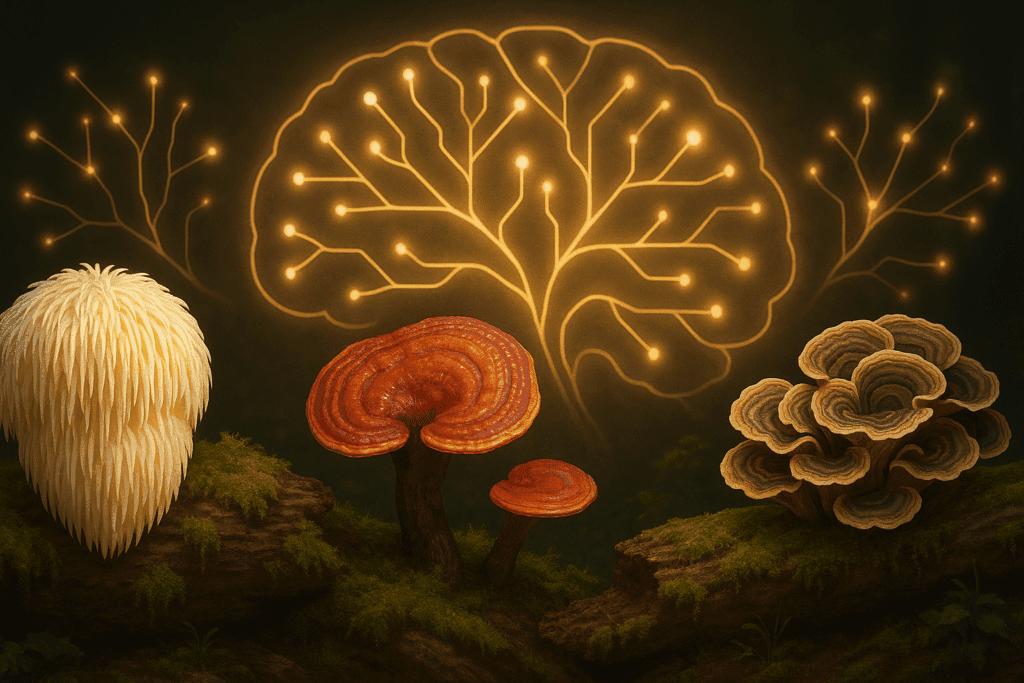
The Science of Nootropic Mushrooms: Lion’s Mane, Turkey Tail, and xiaga drops
Nootropic mushrooms are not merely a trend. These fungi have long-standing roots in traditional medicine and have garnered scientific attention for their potential neuroprotective and cognitive-boosting effects. Compounds such as hericenones and erinacines in Lion’s Mane, polysaccharides in Reishi, and beta-glucans in Turkey Tail provide potent support for neural pathways. Lion’s Mane (Hericium erinaceus), in particular, has demonstrated the ability to stimulate nerve growth factor (NGF) synthesis, a protein integral to the growth, maintenance, and survival of neurons.
Turkey Tail (Trametes versicolor), often highlighted in discussions about the best turkey tail supplement for cancer, exhibits strong antioxidant properties and immune-boosting capabilities. This mushroom has been the focus of numerous cancer studies due to its polysaccharopeptide (PSP) and polysaccharide-K (PSK) content. These compounds may play a role in mitigating the side effects of chemotherapy while supporting immune system function, positioning Turkey Tail as one of the best mushrooms for cancer support. Similarly, Maitake mushrooms have shown promise in cancer research, particularly in studies involving maitake and cancer cell growth inhibition.
Integrating xiaga drops into your daily wellness routine alongside these mushrooms could offer synergistic effects. While mushrooms work on the nervous system and immune response, xiaga drops may enhance cellular detoxification, circulation, and cognitive clarity, forming a holistic approach to brain health.
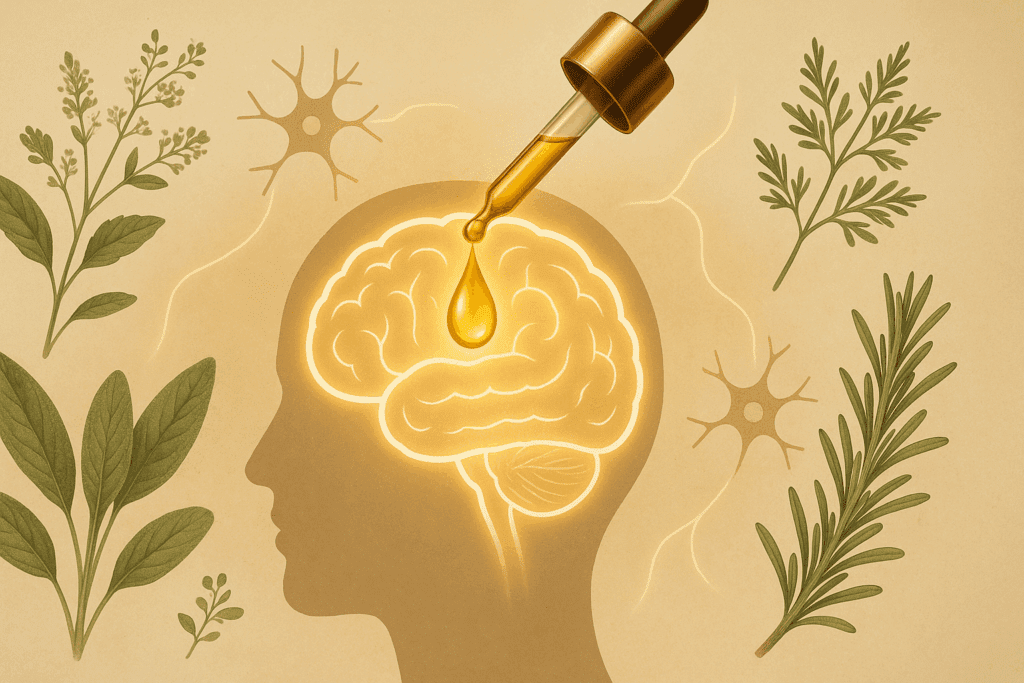
xiaga drops and Neuroprotection: Combating Brain Fog and Inflammation
Xiaga drops are gaining momentum in natural health circles due to their blend of botanical extracts that support cellular health and systemic detoxification. Derived from wildcrafted shiaqga mushroom (a close relative of turkey tail with the botanical name Inonotus obliquus), xiaga drops may influence the body’s ability to combat oxidative stress and neuroinflammation—both of which are key contributors to cognitive decline.
Early evidence and anecdotal reports suggest that xiaga drops can support focus, mental clarity, and emotional balance. This is likely due to their adaptogenic and anti-inflammatory properties, which work to stabilize neurotransmitter function and reduce stress-induced cognitive impairments. In the context of anti-cancer support, shiaqga mushrooms are also being studied for their potential as cancer fighting mushrooms. Researchers continue to explore the effects of medicinal mushrooms and cancer cell modulation, where drops like xiaga may serve as complementary agents in a broader integrative treatment plan.
By addressing the underlying factors that impact memory and cognition, including oxidative stress, inflammation, and immune dysregulation, xiaga drops may provide a multi-targeted approach to cognitive wellness. Combined with the best mushroom for immune system regulation, such as Turkey Tail or Reishi, the drops become part of a powerful natural toolkit for enhancing brain function.
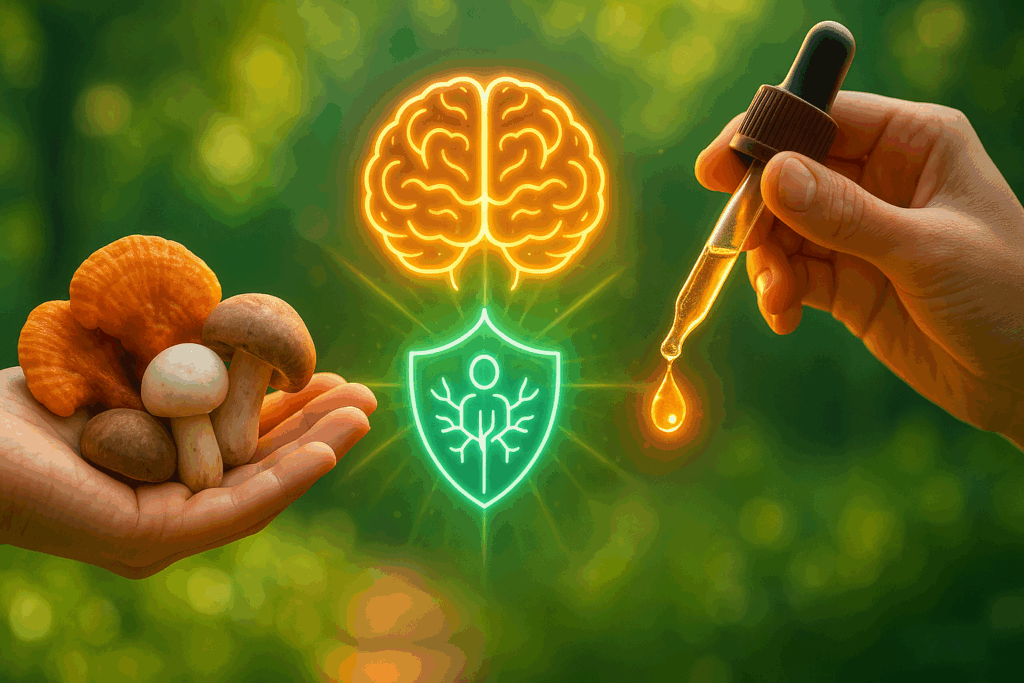
Synergy of xiaga drops and Mushrooms for Memory and Immune Support
The concept of synergy is critical when evaluating the efficacy of combining natural therapies. When xiaga drops are used alongside a protocol of medicinal mushrooms such as Lion’s Mane, Maitake, and Turkey Tail, their individual effects can be amplified. For example, Turkey Tail’s immune-modulating capabilities complement the detoxifying properties of xiaga, creating a supportive environment for neuronal health and resilience against environmental toxins.
Numerous mushroom cancer studies have underscored the unique immunological impact of fungal beta-glucans. These natural polysaccharides activate key immune cells such as macrophages and dendritic cells. When paired with the adaptogenic elements of xiaga drops, these compounds may enhance not only immune response but also cognitive performance by reducing systemic inflammation and improving mitochondrial efficiency.
Another dimension of synergy lies in the psychological domain. Mushroom supplements for cancer, including those based on Maitake and Turkey Tail, often produce calming effects that counteract the stress hormone cortisol. Stress is a known detriment to memory and executive functioning. By pairing these supplements with xiaga drops, users may experience improved mood regulation and a more balanced neurological state, especially beneficial for individuals under chronic stress or those recovering from illness.
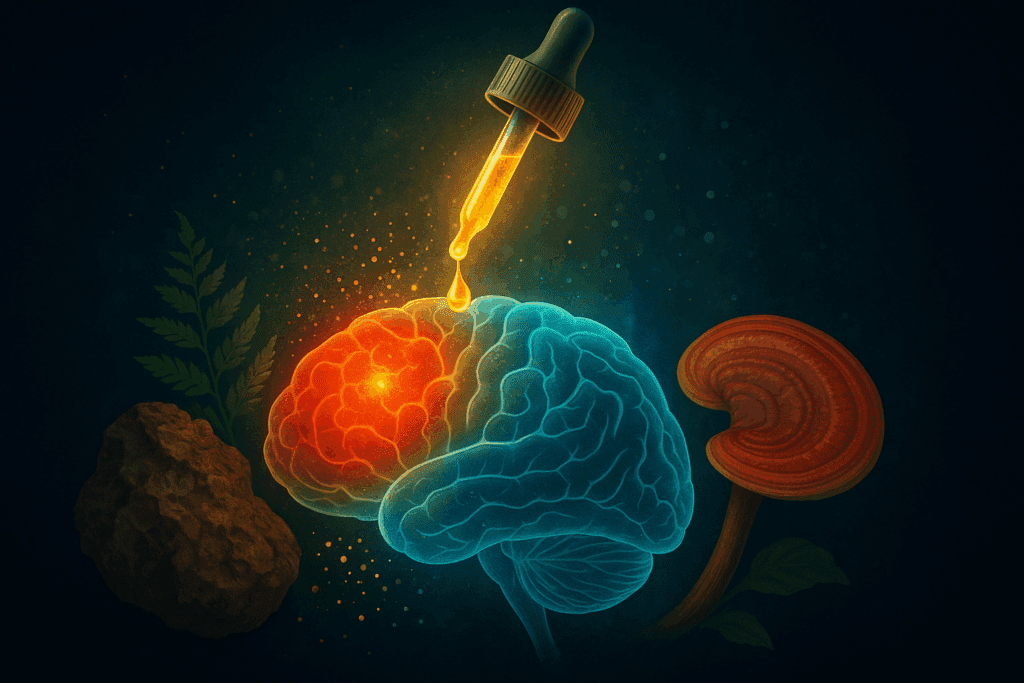
xiaga drops and Their Role in Neuroinflammation and Detoxification
One of the central mechanisms through which xiaga drops may support cognitive health is their impact on neuroinflammation. Chronic low-grade inflammation in the brain is increasingly recognized as a driver of cognitive decline and neurodegenerative diseases such as Alzheimer’s and Parkinson’s. The anti-inflammatory components in xiaga drops, derived from shiaqga mushroom and other botanicals, may attenuate these inflammatory responses by downregulating pro-inflammatory cytokines and promoting cellular repair mechanisms.
Moreover, xiaga drops are thought to support cellular detoxification, particularly in the brain where toxins and heavy metals can accumulate over time. This detoxification effect is critical in protecting brain cells from oxidative damage and apoptosis. Alongside mushrooms good for cancer support—which often include compounds that neutralize free radicals—xiaga drops serve a complementary role in maintaining the biochemical environment necessary for optimal brain function.
In cancer therapy, detoxification is vital to reduce the toxic burden of chemotherapy and radiation. Here, xiaga drops may also prove beneficial as part of mushroom therapy for cancer, offering a natural adjunct that enhances the body’s resilience and ability to recover. The inclusion of mushrooms and breast cancer studies further supports the role of natural adjunct therapies in comprehensive wellness planning.

Boosting Focus and Memory with xiaga drops and Medicinal Mushrooms
Memory and focus are at the heart of cognitive enhancement goals. Xiaga drops, due to their adaptogenic and neuroprotective properties, help regulate neurotransmitters such as dopamine, serotonin, and acetylcholine—chemicals directly linked to mood, alertness, and learning capacity. Meanwhile, nootropic mushrooms such as Lion’s Mane have been shown to stimulate the production of NGF, which is essential for the survival and growth of new neurons in the hippocampus—the brain’s center for memory formation.
In this light, using xiaga drops in tandem with Lion’s Mane and Reishi mushrooms may provide a robust strategy for individuals experiencing age-related cognitive decline, academic stress, or professional burnout. Furthermore, turkey tail cancer study results suggest that Turkey Tail can also enhance gut-brain axis functioning, a critical pathway for maintaining focus and mental clarity.
Individuals searching for the best mushroom for pancreatic cancer or best mushrooms for cancer support may find that cognitive benefits emerge as a secondary yet substantial outcome of immune and metabolic support. This dual-action effect is especially important in maintaining quality of life for individuals managing chronic health conditions.
The Role of Medicinal Mushrooms and Cancer Research in Cognitive Wellness
Cancer fighting mushrooms such as Maitake, Turkey Tail, and Reishi are not solely confined to oncology. Their immune-regulating and antioxidant-rich profiles provide substantial benefits to brain health as well. Research on turkey tail mushroom cancer reviews often reveals an overlap between cancer therapy support and neurological protection, a testament to the holistic nature of these powerful fungi.
The maitake mushroom cancer findings, while preliminary, indicate potential in slowing down the proliferation of abnormal cells and enhancing immune surveillance. The question “can cancer patient eat mushroom” becomes more than a dietary inquiry; it reflects a broader interest in using nature-based interventions to support systemic health. These mushrooms, especially when integrated with xiaga drops, may form the basis of a protective strategy against both cognitive and systemic decline.
Mushroom therapy for cancer and mushrooms for cancer treatment are often incorporated into integrative care plans with the understanding that cognitive and physical health are intertwined. When the body is under assault from cancer or its treatment, the brain often suffers from what is known as “chemo brain” or cancer-related cognitive impairment. Here, mushrooms and xiaga drops may offer a natural path toward restoration and resilience.
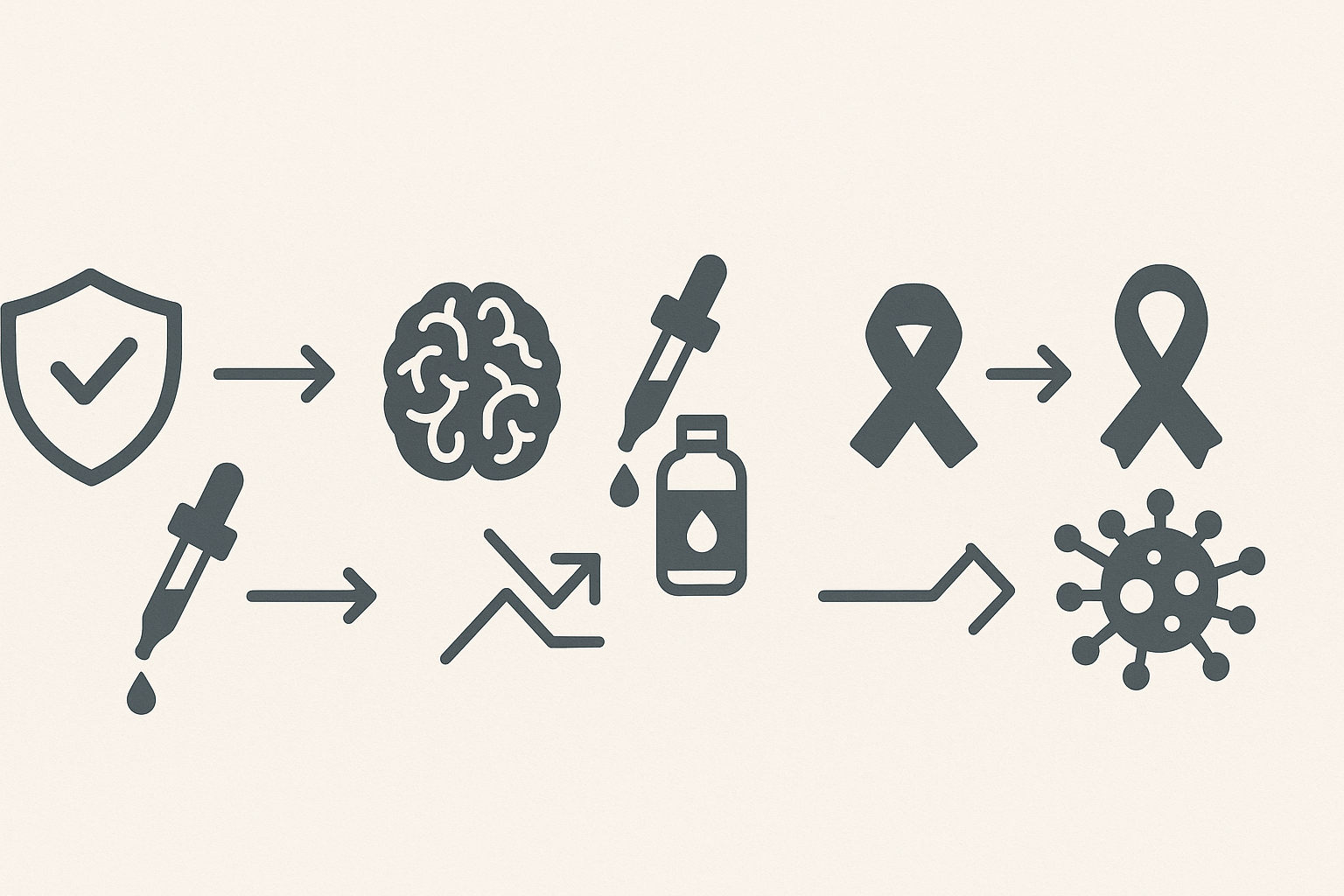
xiaga drops in Clinical Context: From Prevention to Supportive Care
Clinical interest in xiaga drops is growing, with naturopathic doctors and integrative practitioners increasingly exploring their use in both preventive and supportive care. Though large-scale human trials are still emerging, preliminary evidence and clinical observations suggest that these drops can be part of a comprehensive approach to cognitive support.
In the realm of cancer care, turkey tail for cancer patients has become a staple in natural medicine circles. Reviews of turkey tail mushroom cancer studies emphasize its role in immune reconstitution and quality of life improvement. When combined with the systemic support offered by xiaga drops, these mushrooms may enhance post-treatment recovery and long-term brain function.
Moreover, mushrooms cancer study data are helping shift the conversation from purely pharmacological solutions to integrative models of care. Xiaga drops, as a bioavailable form of mushroom extract combined with detoxifying herbs, provide a promising avenue for individuals seeking natural ways to preserve cognition, fight inflammation, and improve mental acuity.
Addressing the Question: Can Cancer Patients Eat Mushrooms?
This question has been addressed extensively in integrative oncology literature. The consensus is that not only can cancer patients eat mushrooms, but they may also benefit substantially from them. Specific mushrooms like Turkey Tail and Maitake are often considered safe and supportive during cancer treatment, particularly when used under the guidance of a healthcare professional. These mushrooms have been the subject of multiple clinical trials, validating their use in boosting immune markers and improving quality of life.
When coupled with xiaga drops, these mushrooms can offer dual benefits—fighting systemic inflammation and protecting cognitive function. The potential to ease symptoms of brain fog, anxiety, and fatigue makes this combination especially appealing for cancer patients. The growing evidence behind turkey tail breast cancer applications further strengthens the case for these functional fungi as part of a broader wellness strategy.
Emerging Evidence and the Path Ahead for xiaga drops and Cognitive Health
As the body of research grows, so too does the appreciation for plant-based and fungal medicine in cognitive support. While questions like “does turkey tail kill cancer cells” remain at the center of ongoing laboratory investigations, the broader benefits of mushroom extracts and xiaga drops are increasingly recognized in both anecdotal and clinical domains.
Future studies will likely focus on refining dosages, understanding long-term effects, and identifying specific mechanisms of action. The ultimate goal is to create safe, effective protocols that merge the wisdom of traditional medicine with the rigor of modern science. In this context, xiaga drops may emerge as a leading adjunct for memory and cognitive enhancement, especially when paired with mushrooms for cancer treatment and immune modulation.
Expanding the Therapeutic Landscape: xiaga drops in Neurodegenerative Disorders
The rising prevalence of neurodegenerative disorders, including Alzheimer’s, Parkinson’s, and multiple sclerosis, has prompted a search for safer and more effective supportive treatments. In this context, xiaga drops are being investigated for their potential neuroprotective effects. Their rich antioxidant profile may counteract the oxidative stress that accelerates the degeneration of neurons. While they are not substitutes for conventional treatments, xiaga drops can serve as complementary support in integrative care strategies that focus on slowing cognitive decline and preserving quality of life.
Research suggests that one of the core mechanisms contributing to neurodegenerative diseases is mitochondrial dysfunction. Xiaga drops, by supporting mitochondrial health and enhancing detoxification, may help protect neurons from premature death and preserve synaptic integrity. When used alongside nootropic mushrooms like Lion’s Mane and Reishi, known for their regenerative effects on neural tissues, a more comprehensive strategy for neuroprotection is achievable.
Additionally, anti cancer mushroom studies have revealed parallels between tumor suppression and the prevention of neurodegeneration. Both require robust immune function, regulation of inflammation, and cellular repair. The overlap in these mechanisms further underscores the potential of combining cancer fighting mushrooms with xiaga drops for a broader spectrum of neurotherapeutic applications.
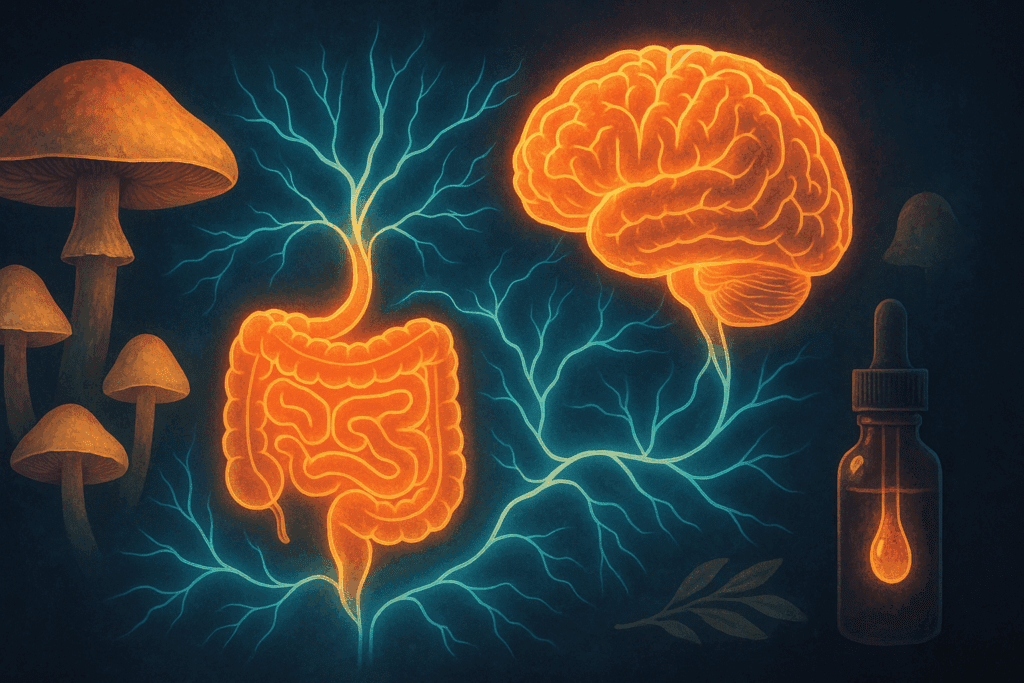
Gut-Brain Axis and Cognitive Vitality: A Hidden Link with xiaga drops and Mushrooms
Recent scientific exploration into the gut-brain axis has transformed our understanding of cognitive health. The gut microbiome, comprising trillions of bacteria and other microorganisms, communicates bidirectionally with the central nervous system through hormonal, immune, and neural pathways. Disruptions in this communication can impair cognitive function, mood regulation, and even memory retention.
Medicinal mushrooms such as Turkey Tail and Maitake play a vital role in nurturing a healthy microbiome. Their prebiotic fibers and polysaccharides serve as fuel for beneficial gut bacteria, promoting a balanced microbial environment that supports neurological well-being. When paired with xiaga drops, which further reduce systemic inflammation and detoxify intestinal pathways, the result is a fortified gut-brain connection that enhances overall cognitive performance.
Studies investigating mushrooms cancer study correlations frequently highlight improvements in metabolic function and microbiome diversity among participants. These changes are not only beneficial for cancer outcomes but are also intricately tied to mental clarity and emotional regulation. Incorporating mushroom therapy for cancer and xiaga drops into one’s daily wellness practice can therefore help improve not just physical but also cognitive health in a deeply interconnected way.
Frequently Asked Questions: xiaga drops, Nootropic Mushrooms, and Cognitive Health
1. What are some unique ways to incorporate xiaga drops into a daily wellness regimen?
Xiaga drops can be added to various routines beyond simply ingesting them directly. One approach is to mix them with adaptogenic teas like ashwagandha or reishi-infused herbal blends, enhancing the synergistic effects on the nervous system. For those using medicinal mushrooms and cancer therapy, pairing xiaga drops with mushroom powders in smoothies can increase bioavailability and support both immunity and cognitive clarity. Others have reported success applying diluted xiaga drops topically for localized inflammation, though this should be discussed with a healthcare provider first. Additionally, some practitioners recommend using the drops during meditation or mindfulness practice to heighten mental clarity and reduce brain fog.
2. How do xiaga drops compare with other cancer fighting mushrooms in terms of long-term use?
Xiaga drops offer a unique blend of shiaqga mushroom extract and other botanicals, making them a convenient option for individuals seeking daily support. Unlike isolated mushroom supplements for cancer, xiaga drops combine detoxification and immune-modulation into a single liquid form. When compared to maitake mushroom cancer capsules or turkey tail for cancer patients, xiaga drops provide broader systemic benefits, including cognitive enhancement and stress reduction. However, because of their concentrated formulation, it is important to cycle usage under supervision to avoid overactivation of immune responses. Over long-term use, patients report fewer gastrointestinal disturbances with xiaga drops compared to some mushroom capsules.
3. What makes the best turkey tail supplement for cancer effective, and can xiaga drops complement it?
The best turkey tail supplement for cancer typically contains high levels of polysaccharopeptide (PSP) and polysaccharide K (PSK), compounds shown to modulate immune function and support chemotherapy outcomes. Turkey tail mushroom cancer studies emphasize the importance of hot water extraction methods and third-party testing for purity and potency. When combined with xiaga drops, which provide cellular detox and neuroprotective support, patients may benefit from a dual-action strategy. This synergy is especially relevant in mushrooms cancer study designs focused on combination therapy. In such integrative protocols, xiaga drops do not replace the immune-focused benefits of turkey tail but add cognitive and systemic resilience to the mix.
4. Can xiaga drops enhance the effectiveness of mushroom therapy for cancer patients undergoing chemotherapy?
Yes, xiaga drops can play a complementary role in enhancing the therapeutic effects of mushroom therapy for cancer. While mushrooms for cancer treatment like maitake and reishi focus on immune regulation, xiaga drops may help mitigate some chemotherapy side effects like mental fatigue, oxidative stress, and inflammation. Their botanical profile supports liver detox pathways, aiding in the elimination of residual drugs and metabolic waste. This may allow cancer fighting mushrooms to act more efficiently within a cleaner biochemical environment. Additionally, patients who incorporate xiaga drops with medicinal mushrooms and cancer-focused diets often report improved focus and mood stability, both of which are crucial for recovery.
5. What emerging research supports the claim that mushrooms prevent cancer or inhibit its progression?
Current mushrooms cancer study data reveal promising results for various species, particularly turkey tail, maitake, and cordyceps. These mushrooms exhibit selective cytotoxicity, meaning they may target cancerous cells without harming healthy tissue. Turkey tail cancer studies have specifically explored its effect on breast and colorectal cancers, while maitake and cancer research points to potential suppression of tumor growth in pancreatic and prostate cancers. However, the phrase “mushrooms cure cancer” is misleading and not supported by conclusive clinical data. Instead, it is more accurate to frame mushrooms as supportive agents in integrative treatment plans. Xiaga drops enhance this support by optimizing the internal environment, making mushrooms more effective in their modulatory roles.
6. How do xiaga drops contribute to the gut-brain axis, and why is this relevant for cancer patients?
The gut-brain axis plays a critical role in regulating mood, immune function, and cognition—factors often compromised in cancer patients. Xiaga drops contain bioactive compounds that reduce gut inflammation and support a healthy microbiome, which indirectly influences brain function. When combined with mushroom good for cancer support, such as turkey tail or lion’s mane, the benefits extend to improved neurotransmitter production and reduced systemic stress. Many cancer fighting mushrooms exhibit prebiotic properties, further enhancing microbiome diversity. Xiaga drops amplify these effects by promoting cellular detox, which aids in the rebalancing of both gut flora and mental clarity during treatment.
7. How do turkey tail mushroom cancer reviews shape public perception and patient outcomes?
Turkey tail mushroom cancer reviews often highlight improvements in quality of life, reduced inflammation, and better treatment tolerance. These testimonials, though anecdotal, have played a significant role in expanding the popularity of mushrooms for cancer. However, it is essential to consider these experiences within the context of broader mushrooms cancer study literature. While reviews suggest that turkey tail for cancer patients may improve outcomes, the individual variability in responses means professional guidance is still crucial. Xiaga drops offer an added layer by helping patients manage cognitive side effects, which are not typically addressed by mushroom supplements alone.
8. What role does the shiaqga mushroom botanical name Inonotus obliquus play in the formulation of xiaga drops?
The botanical name for the shiaqga mushroom used in xiaga drops is Inonotus obliquus, commonly referred to as Chaga in some regions. This mushroom is known for its adaptogenic, antioxidant, and anti-cancer properties. In xiaga drops, the shiaqga mushroom works synergistically with other herbs to improve cellular function, reduce inflammation, and support neurological clarity. Unlike standalone mushroom supplements for cancer, this multi-ingredient formula aims to address both physiological and psychological aspects of health. Inonotus obliquus has been cited in multiple medicinal mushrooms and cancer research papers for its ability to support the immune system and potentially limit tumor development.
9. Are there psychological benefits of combining xiaga drops with cancer fighting mushrooms?
Absolutely. The psychological toll of cancer treatment is often underestimated. Depression, anxiety, and brain fog are common, and mushroom therapy for cancer alone may not fully address these concerns. Xiaga drops help stabilize neurotransmitter function, offering support for mood regulation and cognitive clarity. When used alongside cancer fighting mushrooms, especially those that interact with the gut-brain axis, users often experience reduced emotional volatility and greater resilience. These benefits extend beyond the treatment period, making the combination a potential long-term solution for survivors dealing with post-treatment mental health challenges.
10. How can healthcare practitioners guide patients in choosing between xiaga drops and other mushroom supplements?
Healthcare providers should evaluate each patient’s condition, treatment goals, and tolerance to specific compounds. While turkey tail breast cancer protocols may call for high doses of PSK, patients with cognitive concerns might benefit more from xiaga drops. For immune support, the best mushroom for immune system may vary depending on the patient’s baseline immune activity. Practitioners can design integrative regimens that combine mushroom supplements for cancer with xiaga drops for a layered therapeutic effect. Importantly, any such regimen should be monitored for interactions and adjusted based on clinical markers and patient feedback.
Conclusion: Elevating Brain Health Through Nature’s Wisdom
In summary, the integration of xiaga drops and nootropic mushrooms presents a promising, evidence-informed approach to enhancing brain power and supporting cognitive resilience. Rooted in both tradition and emerging science, this combination addresses key areas such as neuroinflammation, detoxification, immune regulation, and neurogenesis. Whether you are looking to improve memory, sharpen focus, or complement cancer recovery efforts, this holistic strategy offers a compelling pathway toward optimal brain health.
With increasing research on cancer fighting mushrooms and mushroom supplements for cancer, and as turkey tail mushroom cancer reviews continue to support immune and cognitive benefits, the potential of combining these natural agents with xiaga drops becomes even more compelling. As more studies shed light on their mechanisms, usage guidelines, and long-term safety, xiaga drops and nootropic mushrooms may well become essential tools in the growing arsenal for cognitive enhancement and whole-body wellness.
Further Reading :
Recent developments in mushrooms as anti-cancer therapeutics: a review
Current Uses of Mushrooms in Cancer Treatment and Their Anticancer Mechanisms
